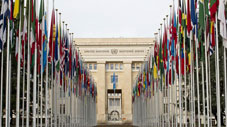
International Community Urges Georgia to Revoke "Foreign Agents" Law and Protect Peaceful Protesters
By Liza Mchedlidze
Monday, July 1, 2024
The permanent representation of 36 countries at the UN office in Geneva and other international organizations has issued a joint statement urging the Georgian government to recall the "Foreign Influence Transparency Law" and cease using force against peaceful demonstrators.
The statement responds to concerns raised by the UN High Commissioner in his global report about recent events in Georgia, specifically highlighting the controversial "Foreign Agents" law. According to the signatories, the law poses a serious threat to civil society, human rights, and the rule of law in Georgia.
"This law is intended to have a constraining effect on the activities of the media, human rights defenders, and civil society organizations, with the aim of suppressing their voices," the statement reads. It further criticizes the Georgian government for adopting the law despite widespread public opposition and numerous international calls to halt the legislation, including detailed legal arguments from the Venice Commission.
The international representatives call on the Georgian government to withdraw the law, end intimidation campaigns against its opponents, and uphold freedoms of expression, assembly, and peaceful protest. They emphasize the importance of civil society in maintaining democratic accountability, transparency, and resilience against harmful influences.
The statement also demands that the Georgian government transparently investigate all incidents of force used against peaceful demonstrators and take appropriate actions to ensure the safety of protesters, civil society members, opposition activists, journalists, and other media workers. It warns against rhetoric that could exacerbate polarization in the country.
"The orchestrated campaign of defamation, intimidation, and physical violence against civil society leaders and others is unacceptable and must stop," the statement reads.
Among the 36 signatories are 25 EU countries (excluding Hungary and Slovakia), along with the USA, UK, Ukraine, Switzerland, Norway, Canada, Albania, Montenegro, Monaco, Liechtenstein, and Iceland.

